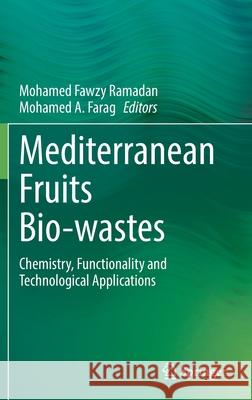Mediterranean Fruits Bio-Wastes: Chemistry, Functionality and Technological Applications » książka



Mediterranean Fruits Bio-Wastes: Chemistry, Functionality and Technological Applications
ISBN-13: 9783030844356 / Angielski / Twarda / 2022 / 590 str.
Mediterranean Fruits Bio-Wastes: Chemistry, Functionality and Technological Applications
ISBN-13: 9783030844356 / Angielski / Twarda / 2022 / 590 str.
(netto: 843,44 VAT: 5%)
Najniższa cena z 30 dni: 848,19
ok. 16-18 dni roboczych.
Darmowa dostawa!
Section 1: General Aspects.- Introduction to Mediterranean Fruits Bio-wastes: Chemistry, Functionality and Techno-applications.- Potentials of Biowaste Carbohydrates in Gut Health Enhancement.- Section 2: Olive Bio-wastes: Chemistry, Functionality and Technological Applications.- Olive fruit by-products: from waste streams into promising source of value-added products.- Anaerobic digestion technology of solid and liquid forms of olive wastes in Mediterranean area.- Agronomic olive bio-waste management: Combination of olive mill wastewater (OMW) spreading and compost amendment – Effects on soil properties and olive tree performance quality.- Olive waste as promising approach to produce antioxidants, biofertilizers and biogas.- Section 3: Citurs Bio-wastes: Chemistry, Functionality and Technological Applications.- Citrus biowastes: Applications in production and quality enhancement of food from animal sources.- Valorization of grapefruit (Citrus × paradisi) processing wastes.- Citrus bio-wastes: source of bioactive, functional products and non-food uses.- Citrus Sinensis (Sweet Oranges) Wastes: The Orange Wealth.- Tangerine (Citrus reticula L.) Wastes.- Lemon (Citrus limon) bio-waste: Chemistry, Functionality and Technological Applications.- Section 4: Apple and pear Bio-wastes: Chemistry, Functionality and Technological Applications.- Valorisation of Apple (Malus domestica) Wastes.- Apple (Malus domestica) by-products: Chemistry, Functionality and Industrial Applications.- Chemistry, Functionality and Technological Applications of Pear Bio-waste.- Section 5: Date palm Bio-wastes: Chemistry, Functionality and Technological Applications.- Valorization of Date Palm (Phoenix dactylifera) Wastes and By-Products.- Date palm (Phoenix dactylifera L.) wastes valorisation: A circular economy approach.- Section 6: Bio-wastes from grape and berries: Chemistry, Functionality and Technological Applications.- An Insight into the Brilliant Benefits of Grape Waste.- Grape (Vitis vinifera) biowastes: Applications in egg, meat and dairy production and products.- Vaccinium berry processing wastes: composition and biorefinery possibilities.- Strawberry (Fragaria ananassa) Wastes.- Section 7: Prunus Bio-wastes: Chemistry, Functionality and Technological Applications.- Apricot (Prunus armeniaca L.) kernel: a valuable by-product.- Valorization of Sweet Cherry (Prunus avium) Wastes as a Source of Advanced Bioactive Compounds.- Peach (Prunus persica) bio-waste: Chemistry, Functionality and Technological Applications.- Valorization of peach (Prunus persica) fruit waste.- Plum (Prunus domestica) Wastes.- Section 8: Cucurbitaceae Bio-wastes: Chemistry, Functionality and Technological Applications.- Leveraging the Cucumis melo wastes.- Citrallus Lanatus (Watermelon) Wastes: Maximizing the Benefits and Saving the Environment.- Pumpkin Bio-Wastes as Source of Functional Ingredients.- Section 9: Bio-wastes from Other Fruits: Chemistry, Functionality and Technological Applications.- Avocado (Persea americana) wastes: chemical composition, biological activities and industrial applications.- Industrial Pomegranate Wastes and Their Functional Benefits in Novel Food Formulations.- Valorization of Persimmon (Diospyros kaki) wastes to be used as functional ingredients.- Carob (Ceratonia Siliqua): Agro-industrial Waste and Potential Uses in the Circular Economy.- Utilization of Tomato (Solanum lycopersicum) BY-PRODUCTS: AN OVERVIEW.- Valorization of guava fruits byproducts: Chemical composition, bioactive components, and technical concerns to food industry
Mohamed Fawzy Ramadan is a Professor in the Agricultural Biochemistry Department, Faculty of Agriculture at Zagazig University in Zagazig, Egypt. Since 2013, Prof. Ramadan is a Professor of Biochemistry and international publishing consultant at the Deanship of Scientific Research (Umm Al-Qura University, Makkah, Saudi Arabia). Prof. Ramadan obtained his Ph.D. (Dr. rer. nat.) in Food Chemistry from Berlin University of Technology (Germany, 2004). Prof. Ramadan continued his post-doctoral research in ranked universities in different countries such University of Helsinki (Finland), Max-Rubner Institute (Germany), Berlin University of Technology (Germany), and University of Maryland (USA). In 2010, he was appointed to be Visiting Professor (100% research) at King Saud University. In 2012, he was appointed to be visiting Professor (100% teaching) in the School of Biomedicine, Far Eastern Federal University in Vladivostok, Russian Federation. Prof. Ramadan published more than 250 research papers and reviews in international peer-reviewed journals and several books and book chapters (Scopus h-index is 40 and more than 5000 citations). In addition, he was an invited speaker at several international conferences. Since 2003, Prof. Ramadan is a reviewer and editor in several highly-cited international journals such as the Journal of Medicinal Food and Journal of Advanced Research. Prof. Ramadan received Abdul Hamid Shoman Prize for Young Arab Researcher in Agricultural Sciences (2006), Egyptian State Prize for Encouragement in Agricultural Sciences (2009), European Young Lipid Scientist Award (2009), AU-TWAS Young Scientist National Awards (Egypt) in Basic Sciences, Technology and Innovation (2012), TWAS-ARO Young Arab Scientist (YAS) Prize in Scientific and Technological Achievement (2013), and Atta-ur- Rahman Prize in Chemistry (2014)
Traditional Mediterranean fruits (i.e., be grapes, oranges, apples, pears, peaches, cherries, plums, figs, melons, watermelon and dates) are of major commercial and nutritional value to the region. Processing of such fruits, however, results in large amounts of bio-waste material. Efficient, inexpensive and environmentally friendly use of fruit industry waste is thus highly cost-effective and minimizes environmental impact. The natural antioxidants and bioactive compounds found in Mediterranean fruit bio-wastes could play a major role in the alleged health benefits of the Mediterranean diet, and could be used in pharmaceuticals as well as novel food applications.
This book presents a multidisciplinary forum of discussion on the chemistry, functional properties, health-promoting effects of bioactive compounds in Mediterranean fruit bio-wastes, as well as novel food and non-food applications. The text provides the scientific fundamentals of the health-promoting benefits and applications of Mediterranean fruit bio-wastes, reviews the relevant recovery issues, and explores different techniques to develop new applications. With a diversity of perspectives, from food science to environmental chemistry and horticultural research, this volume provides comprehensive, up-to-date knowledge to researchers and industry professionals working in the areas of food waste valorization.
1997-2026 DolnySlask.com Agencja Internetowa
KrainaKsiazek.PL - Księgarnia Internetowa









